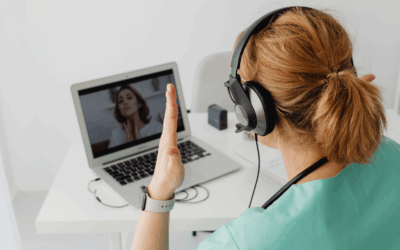In an era where digital transformation is reshaping healthcare, ensuring data security remains a paramount concern. Virtual medical assistants (VMAs) have become an integral part of many healthcare practices, offering essential support in administrative and clinical tasks. However, with the increased reliance on digital tools comes the necessity to safeguard sensitive patient information. This blog explores how virtual medical assistants are trained in HIPAA compliance, secure communication channels, and data storage practices to protect patient information effectively.
Understanding the Importance of Data Security in Healthcare for Virtual Medical Assistants
Healthcare data is among the most sensitive types of personal information. It includes patient records, medical histories, billing information, and more. Breaches of this data can lead to significant consequences, including identity theft, financial loss, and damage to a healthcare provider’s reputation. Therefore, it is crucial for healthcare practices to implement robust data security measures, especially when incorporating virtual medical assistants into their operations.
HIPAA Compliance and Training for Virtual Medical Assistants
The Health Insurance Portability and Accountability Act (HIPAA) sets the standard for protecting sensitive patient data in the United States. Virtual medical assistants must undergo rigorous training to ensure they understand and comply with HIPAA regulations.
 1. Comprehensive HIPAA Training
1. Comprehensive HIPAA Training
VMAs receive extensive training on HIPAA rules and regulations. This training covers various aspects, including patient privacy, data security measures, and the proper handling of medical records.
Key Components of HIPAA Training:
- Understanding HIPAA: Detailed education on the Privacy Rule, Security Rule, and Breach Notification Rule.
- Patient Rights: Knowledge about patients’ rights under HIPAA, including the right to access and control their health information.
- Security Protocols: Training on implementing physical, administrative, and technical safeguards to protect health information.
 2. Regular Refresher Courses
2. Regular Refresher Courses
Given the evolving nature of healthcare regulations and technologies, VMAs participate in regular refresher courses to stay up-to-date with the latest compliance requirements and best practices.
Benefits of Regular Training:
- Updated Knowledge: Ensures VMAs are aware of any changes in HIPAA regulations.
- Reinforced Practices: Reinforces the importance of data security and the correct procedures to follow.
- Continuous Improvement: Encourages the adoption of new security technologies and methods.
How Virtual Medical Assistants Secure Communication Channels
One of the primary responsibilities of VMAs is to manage communications within a healthcare practice. This includes handling patient inquiries, scheduling appointments, and coordinating with other healthcare providers. Ensuring these communications are secure is critical to protecting patient information.
 3. Encrypted Communication Tools
3. Encrypted Communication Tools
VMAs use encrypted communication tools to ensure that all patient interactions remain confidential. Encryption converts data into a code to prevent unauthorized access during transmission.
Examples of Encrypted Tools:
- Secure Email Services: Platforms that offer end-to-end encryption for email communications.
- Telehealth Platforms: Encrypted video conferencing tools that comply with HIPAA standards.
- Messaging Apps: Secure messaging applications designed for healthcare use.
 4. Secure Patient Portals
4. Secure Patient Portals
Patient portals are increasingly used for communication between patients and healthcare providers. VMAs help manage these portals, ensuring that all interactions and data exchanges are secure.
Features of Secure Patient Portals:
- User Authentication: Strong authentication processes to verify user identity.
- Data Encryption: Encryption of data at rest and in transit.
- Audit Trails: Logs of all access and activities to monitor for any unauthorized actions.
Virtual Medical Assistants in Protecting Patient Information in Data Storage
Data storage is another critical aspect of ensuring data security. Virtual medical assistants play a significant role in managing and protecting stored patient information.
 5. Secure Cloud Storage
5. Secure Cloud Storage
Many healthcare practices utilize cloud storage solutions for their data needs. Virtual medical assistants are trained to use HIPAA-compliant cloud services that offer robust security features.
Key Features of Secure Cloud Storage:
- Data Encryption: Ensures that data is encrypted both at rest and in transit.
- Access Controls: Restricts data access to authorized personnel only.
- Regular Backups: Frequent data backups to prevent data loss in case of an incident.
 6. Data Access Management
6. Data Access Management
Controlling access to sensitive data is essential for preventing unauthorized access. Virtual medical assistants implement and manage strict access control policies.
Components of Access Management:
- Role-Based Access Control (RBAC): Assigns access permissions based on the user’s role within the organization.
- Multi-Factor Authentication (MFA): Requires multiple forms of verification before granting access to data.
- Activity Monitoring: Continuously monitors user activities to detect and respond to suspicious behavior.
 7. Data Anonymization
7. Data Anonymization
To protect patient identities, VMAs can use data anonymization techniques. Anonymization removes personally identifiable information from data sets, making it difficult to trace back to individual patients.
Benefits of Data Anonymization:
- Enhanced Privacy: Reduces the risk of identity theft and privacy breaches.
- Safe Data Sharing: Allows for the sharing of data for research and analysis without compromising patient privacy.
How Virtual Medical Assistants Practice Safe Data Handling
Beyond technical safeguards, virtual medical assistants must also practice safe data-handling procedures in their daily tasks.
 8. Secure Work Environments
8. Secure Work Environments
Even though virtual medical assistants work remotely, they must maintain a secure work environment to protect sensitive information.
Best Practices for Secure Remote Work:
- Private Workspace: Working in a private, secure area away from public view.
- Screen Privacy Filters: Using privacy filters to prevent screen data from being visible to others.
- Device Security: Ensuring that all devices used for work are secure and regularly updated.
 9. Safe Disposal of Information
9. Safe Disposal of Information
Proper disposal of sensitive information is crucial to prevent data breaches. Virtual medical assistants are trained in safe disposal practices.
Methods of Safe Disposal:
- Digital Data: Using secure deletion tools to permanently erase digital files.
- Physical Records: Shredding physical documents before disposal
Ensuring data security with virtual medical assistants involves a multifaceted approach.
By focusing on these areas, healthcare practices can protect sensitive patient information while benefiting from the efficiencies and support that virtual medical assistants provide.
The integration of VMAs into healthcare practices not only helps to streamline operations but also enhances the overall patient experience by ensuring that their information is handled with the utmost care and security. As the healthcare landscape continues to evolve, maintaining a strong focus on data security will be essential for building trust and providing high-quality care.
Leverage our Virtual Medical Assistants and see the results for yourself!
Discover the ultimate solution for streamlining your medical practice: our Virtual Medical Assistants! These professionals will also help you how to lead your team through challenging times. Our team of highly skilled VMAs offers unparalleled care and assistance for both your patients and your practice. Say goodbye to extended wait times and limited availability, and say hello to personalized support. Our VMAs can take care of all aspects of patient care, enabling you to prioritize your patients. Experience the transformative results firsthand–start by scheduling a short and quick consultation call with us by clicking here!








